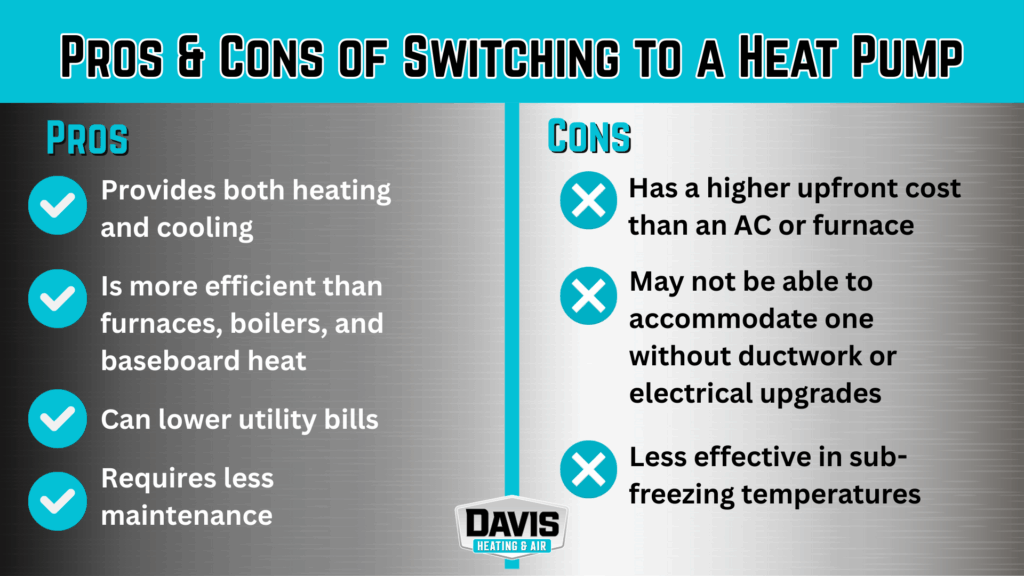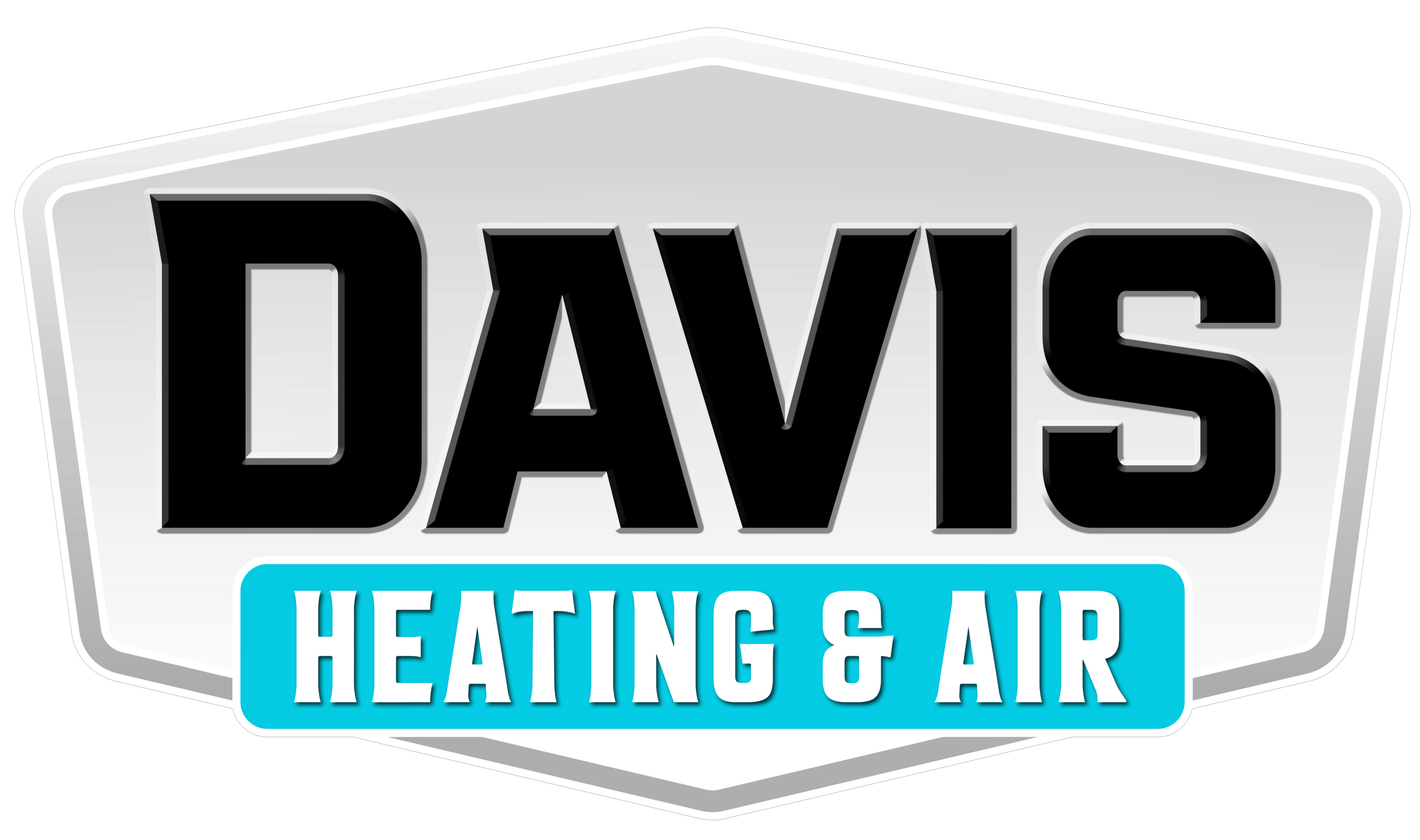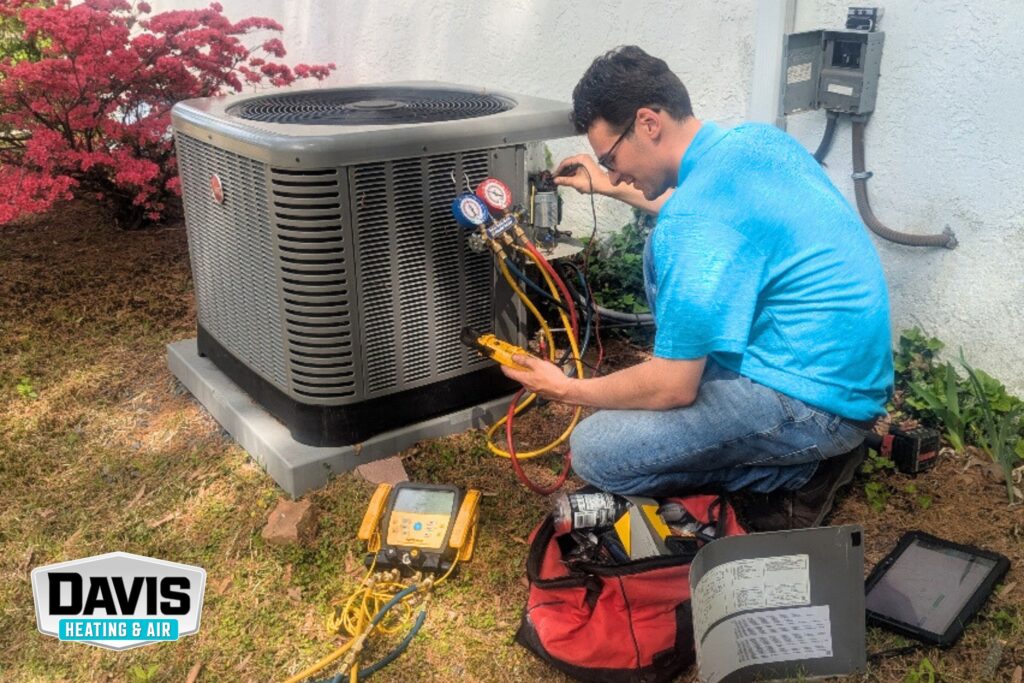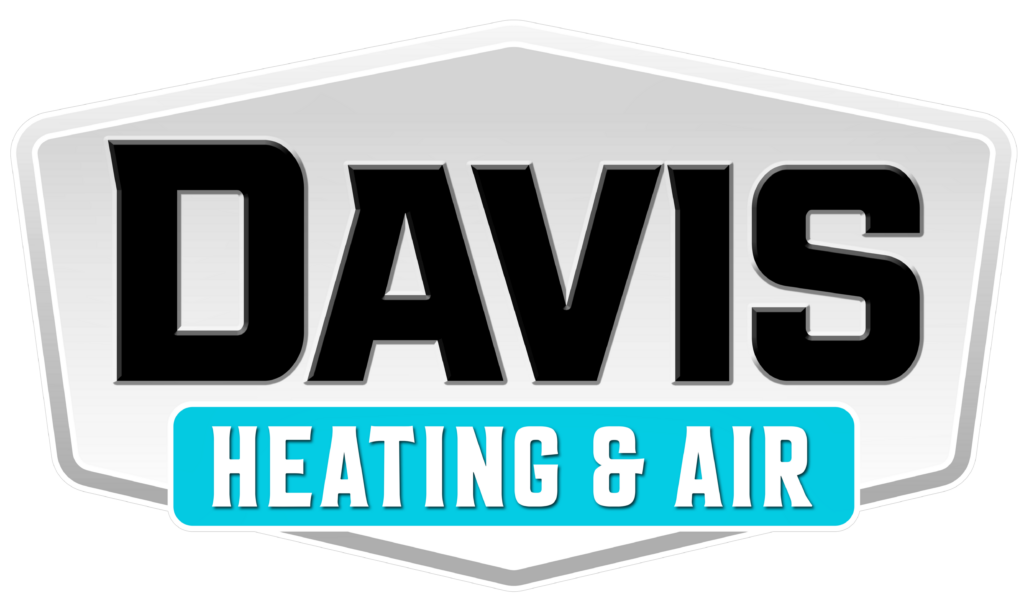If you’re considering a more efficient way to heat and cool your home in South Jersey or your air conditioner is ready for replacement, you may be wondering: Should I switch to a heat pump? The answer depends on your current system, energy goals, and how well your home is set up for modern HVAC technology.
Here, the pros from Davis Heating & Air will break down heat pump pros and cons, how they perform in South Jersey’s climate, and how to know if switching is the right choice for your home.
What Is a Heat Pump and How Does It Work?
A heat pump is a versatile HVAC system that provides both heating and cooling. In the summer, it works like a traditional central air conditioner, moving heat out of your home. In the winter, it reverses the process, extracting heat from the outside air and transferring it inside.
Unlike a furnace or boiler, which generates heat by burning fuel, a heat pump moves heat using electricity, making it one of the most energy-efficient HVAC systems available.
There are several types of heat pumps available:
- Air-source heat pumps: The most common type is an air-source heat pump, which is ideal for most homes in South Jersey.
- Ducted or ductless mini-splits: These are suitable for homes with or without existing ductwork.
- Dual-fuel heat pump systems: These systems combine an electric heat pump with a gas furnace for improved performance during extreme cold.
Pros and Cons of Switching to a Heat Pump
Like any system, heat pumps have their advantages and drawbacks. Here’s what to consider before switching to a heat pump:

Pros
- Year-round comfort: One system handles both heating and cooling.
- Improved efficiency: A heat pump uses less energy than gas or electric resistance heating.
- Lower utility bills: You can see significant cost savings, especially during mild winters or if you have an all-electric home.
- Less maintenance: A heat pump has fewer mechanical parts than combustion systems.
Cons
- Upfront cost: The installation cost may be more expensive than replacing a single air conditioner or furnace.
- Home upgrades may be needed: Some homes need ductwork updates or electrical panel improvements to accommodate a heat pump.
- Cold-weather limitations: In freezing temperatures, a dual-fuel heat pump system may be more effective than a standalone unit.
Heat Pump vs. Furnace in South Jersey’s Climate
When comparing a heat pump vs. a furnace, climate matters. South Jersey winters are cold, but not typically severe, making heat pumps a reliable primary heat source for most homes in Cherry Hill, Mount Laurel, and Burlington.
Heat pumps excel in humid summers, offering efficient cooling. In winter, they perform best above freezing, though newer models are more cold-climate capable than ever. For homes that see frequent sub-freezing temperatures, a dual-fuel heat pump system offers the best of both worlds, using the heat pump as the primary source and a furnace as backup when needed.
When it comes to cost, electricity tends to be more stable in price than gas, which can mean long-term energy savings for many homeowners. However, the right choice depends on your home’s size, insulation, and existing setup.
How To Know If a Heat Pump Is Right for Your Home
Not every home is an immediate candidate for installing a heat pump, but many are. Here’s how to determine if a heat pump is right for your home:
- Your insulation is in good shape: Well-sealed homes are ideal for efficient heat pump performance.
- You have a compatible electrical panel: Heat pumps may require 200-amp service. You’ll need to calculate your home’s electrical load to make an accurate determination.
- You want to reduce fossil fuel usage: Going electric helps reduce your carbon footprint.
- Your current system is aging: If your furnace or AC is more than 10 to 15 years old, switching now may save on future repairs.
Another heat pump benefit: These units help improve indoor air quality by circulating air year-round and avoiding combustion byproducts. If your home has issues with dry air, dust, or inconsistent airflow, this could be an added bonus.
What To Expect From a Heat Pump Installation
The process of heat pump installation in South Jersey typically includes:
- A full home evaluation and load calculation
- Recommending the right size and model for your comfort needs
- Potential upgrades to your ductwork or electrical panel
- Professional installation and post-installation testing
At Davis Heating & Air, we walk homeowners through every step of the process. Whether you’re replacing an older HVAC system or building something new, we help you choose the most efficient solution for your home and budget.
We also offer protection through our Davis Comfort Elite Plan, which includes priority service, maintenance reminders, and exclusive discounts.
Get Honest Heat Pump Advice From Davis Heating & Air
Switching to a heat pump offers big potential benefits: improved comfort, lower energy costs, and a more sustainable heating and cooling system. But it’s not the right fit for every home—and at Davis Heating & Air, we’ll give you an honest assessment either way.
If you’re considering a heat pump installation in South Jersey, reach out to our team for a free consultation. We proudly serve homeowners in Cherry Hill, Mount Laurel, Burlington, and nearby areas with clear guidance and zero pressure.
Frequently Asked Questions About Switching to a Heat Pump
Is a heat pump enough to heat my home in the winter?
Yes, a heat pump provides enough heat for most South Jersey homes. Modern heat pumps are more efficient than ever and can reliably heat your home in cold weather. In very low temperatures, a dual-fuel heat pump system can provide added peace of mind.
Will a heat pump really save me money?
Yes, a heat pump should save you money. Because heat pumps move heat rather than generate it, they use significantly less energy than furnaces or baseboard heaters. Most South Jersey homeowners see lower monthly bills, especially in spring and fall.
Do I need to upgrade my electrical panel for a heat pump?
You might need an upgrade to your electrical panel for a heat pump, but it depends on your current panel and your home’s electrical load. Some heat pumps require 200-amp service. During your consultation, a technician will assess your panel and let you know if an upgrade is needed.
How long do heat pumps last compared to other systems?
Most heat pumps last 12 to 15 years with proper maintenance, which is similar to central AC units. Regular tune-ups and filter changes can extend the system’s lifespan and protect your investment.


